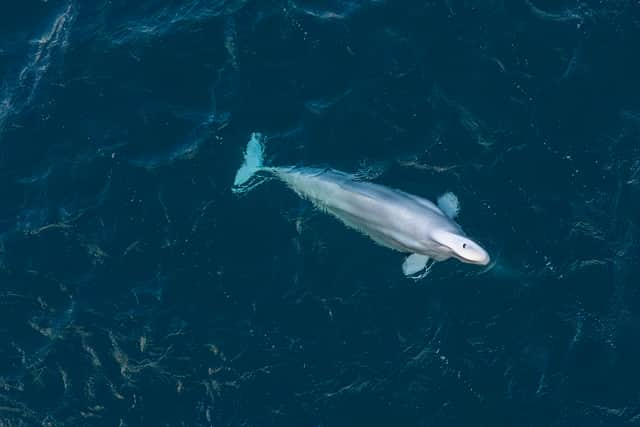Beluga whales: Drone footage captures white whale's rare 'once in a lifetime' visit to the Shetland coast
and live on Freeview channel 276
A drone has managed to capture incredible footage of a beluga whale swimming off the coast of Shetland - in an incredibly rare visit to the UK.
The whale, native to the frigid waters of the Arctic, could be seen dipping in and out of the icy water this week - blowing water out of its blowhole. Richard Shucksmith, an ecologist and wildlife photographer, captured the rare sighting on camera after being alerted to the rare visitor's presence by locals.
Advertisement
Hide AdAdvertisement
Hide Ad"Someone had spotted something in the water and described it. I suspected it to be a beluga," he told SWNS. "So I contacted my colleagues Phil Harris and Rebecca Nason at Shetland Seabird Tours who picked me up in their 4x4, as I was actually snowed in at my house."


The area they needed to get to to be able to see the whale was only accessible by four-wheel-drive, he continued, as the weather conditions were so bad. Mr Shucksmith, who currently lives in South Nesting in the Shetland Isles, said that the experience was a first for him as a wildlife photographer.
"This was the first time I've ever seen and filmed a beluga whale," he said. "I was very excited when I caught the footage, it was brilliant to see, I loved it."
While a number of different whale and dolphin species frequent the UK's waters, belugas are a rare visitor. As of 2015, there had been less than 20 sightings of them, according to Whale and Dolphin Conservation. However in 2018, a beluga nicknamed 'Benny' appeared to be heading to London - famously making himself at home in the Thames Estuary for a number of months.
Advertisement
Hide AdAdvertisement
Hide AdBest known for the soft, squishy 'melons' on their heads - actually an organ used for echolocation - beluga whales usually prefer the frigid waters of the arctic. They are, however, known to migrate to river estuaries in warmer waters during the cold season.
Belugas can grow up to 5.5 metres long and eat a range of fish - including salmon, halibut, and cod - although they are also known to eat crustaceans like shrimp, octopus, or even sea snails on occasion. The species is currently not considered endangered overall, although some populations are at risk - with Alaska's Cook Inlet belugas considered critically endangered.
The species face a number of threats, including river pollution, diseases, and climate change-driven ocean warming.
Comment Guidelines
National World encourages reader discussion on our stories. User feedback, insights and back-and-forth exchanges add a rich layer of context to reporting. Please review our Community Guidelines before commenting.
